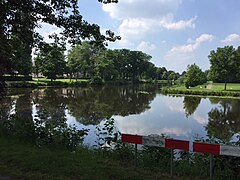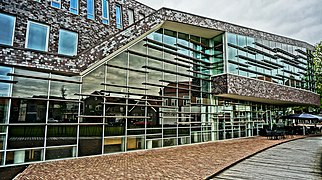Coevorden
Coevorden
Koevern (Dutch Low Saxon) | |
|---|---|
City and municipality | |
 Castle and city hall of Coevorden in 2007 | |
 Location in Drenthe | |
| Coordinates: 52°40′N 6°45′E / 52.667°N 6.750°E | |
| Country | Netherlands |
| Province | Drenthe |
| Government | |
| • Body | Municipal council |
| • Mayor | Renze Bergsma (CDA) |
| Area | |
| • Total | 299.69 km2 (115.71 sq mi) |
| • Land | 296.07 km2 (114.31 sq mi) |
| • Water | 3.62 km2 (1.40 sq mi) |
| Elevation | 12 m (39 ft) |
| Population (January 2021)[4] | |
| • Total | 35,317 |
| • Density | 119/km2 (310/sq mi) |
| Demonym | Coevordenaar |
| Time zone | UTC+1 (CET) |
| • Summer (DST) | UTC+2 (CEST) |
| Postcode | 7740–7759, 7840–7869 |
| Area code | 0524, 0528, 0591 |
| Website | www |
Coevorden (Dutch pronunciation: [ˈkuvɔrdə(n)] ; Dutch Low Saxon: Koevern; German: Kuhfurt) is a city and municipality in the province of Drenthe, in the east of the Netherlands. During the 1998 municipal reorganisation in the province, Coevorden merged with Dalen, Sleen, Oosterhesselen and Zweeloo, retaining its name. In August 2017, it had a population of 35,267.
Etymology
[edit]The name Coevorden means "cow ford(s)" or "cow crossing", similar to Bosporus or Oxford.[5]

History
[edit]
Coevorden received city rights in 1408. It is the oldest city in the province of Drenthe.
The city was captured from the Spanish in 1592 by a Dutch and English force under the command of Maurice, Prince of Orange. The following year it was besieged by a Spanish force but the city held out until its relief in May 1594. Coevorden was then rebuilt in the early seventeenth century to an ideal city design, similar to Palmanova. The streets were laid out in a radial pattern within polygonal fortifications and extensive outer earthworks.
The city of Coevorden indirectly gave its name to both Vancouver, British Columbia, Canada and Vancouver, Washington, named after the 18th-century British explorer George Vancouver. The explorer's ancestors (and family name) originally came to England "from Coevorden" (van Coevern in Dutch Low Saxon).[5] There is also a family of nobility with the surname van Coeverden, sometimes spelled with a K (as with Canadian kayaker Adam van Koeverden).
Geography
[edit]
Coervorden is located at 52°40′N 6°45′E / 52.667°N 6.750°E in the south of the province of Drenthe in the east of the Netherlands.
The population centres in the municipality are:
- Aalden
- Achterste Erm
- Ballast
- Benneveld
- Coevorden
- Dalen
- Dalerpeel
- Dalerveen
- De Kiel
- De Mars
- Den Hool
- Diphoorn
- Eldijk
- Erm
- Gees
- Geesbrug
- Grevenberg
- 't Haantje
- Holsloot
- Hoogehaar
- Kibbelveen
- Klooster
- Langerak
- Meppen
- Nieuwe Krim
- Nieuwlande
- Noord-Sleen
- Oosterhesselen
- Padhuis
- Pikveld
- Schimmelarij
- Schoonoord
- Sleen
- Steenwijksmoer
- Stieltjeskanaal
- Valsteeg
- Veenhuizen
- Vlieghuis
- Vossebelt
- Wachtum
- Weijerswold
- Wezup
- Wezuperbrug
- Zweeloo
- Zwinderen
International relations
[edit]Coevorden is twinned with:

|
Transportation
[edit]There are two railway stations in the municipality:
Notable people
[edit]- Johannes Benedictus van Heutsz (1851-1924). Gouverneur-generaal (1904-09), a Dutch military officer and governor general of the Dutch East Indies in 1904
- Albert Bouwers (1893 in Dalen – 1972) a Dutch optical engineer, worked with X-Rays
- Relus ter Beek (1944 in Coevorden – 2008) a Dutch politician
- Tim de Zeeuw (born 1956 in Sleen) a Dutch astronomer specializing in the galaxies
- Thijs Berman (born 1957 in Coevorden) a former journalist, a Dutch politician and a Member of the European Parliament
- Herman von Hebel (born 1961 in Coevorden) was a Registrar of the International Criminal Court
- Maxim Februari (born 1963 in Coevorden) a Dutch writer, philosopher and columnist
- Joël Voordewind (born 1965 in Sleen) a Dutch politician
- Don Pepijn Schipper (born 1980 in Coevorden) stage name Don Diablo is a Dutch DJ, record producer, musician and songwriter of electronic dance music
- Mark-Jan Fledderus (born 1982 in Coevorden) a Dutch retired footballer with 321 caps
See also
[edit]- George Vancouver § Origins of the family name
- Fantasy Gardens, a replica of Coevorden Castle donated to Richmond, British Columbia for the Expo 86
Gallery
[edit]-
Coevorden Wilhelminastraat, Sint-Willibrordeus church
-
Coevorden Castle
-
Moat at the Van Heutszpark
-
Coevorden city hall
References
[edit]- ^ "Burgemeester en wethouders" [Mayor and aldermen] (in Dutch). Gemeente Coevorden. Archived from the original on 21 September 2013. Retrieved 6 October 2013.
- ^ "Kerncijfers wijken en buurten 2020" [Key figures for neighbourhoods 2020]. StatLine (in Dutch). CBS. 24 July 2020. Retrieved 19 September 2020.
- ^ "Postcodetool for 7741GC". Actueel Hoogtebestand Nederland (in Dutch). Het Waterschapshuis. Retrieved 6 October 2013.
- ^ "Bevolkingsontwikkeling; regio per maand" [Population growth; regions per month]. CBS Statline (in Dutch). CBS. 1 January 2021. Retrieved 2 January 2022.
- ^ a b "Coevorden". The History of Metropolitan Vancouver. The History of Metropolitan Vancouver. Retrieved 2013-03-26.
- ^ "Embassy of the Republic of Belarus in the Kingdom of the Netherlands - News of the Embassy". Netherlands.mfa.gov.by. 2011-05-16. Archived from the original on 2012-11-28. Retrieved 2013-03-26.







